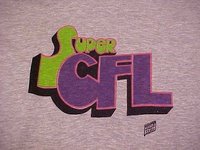« Home | CBS Corp: First Move To Counter FCC Indecency Move... »
When Radio Formats Change
 The Internet is the afterlife heaven when your favorite radio station changes formats, from old Stern broadcasts to just about any viral audio classic, if you look hard enough. Especially on peer2peer places like Limewire and BitTorrent.
The Internet is the afterlife heaven when your favorite radio station changes formats, from old Stern broadcasts to just about any viral audio classic, if you look hard enough. Especially on peer2peer places like Limewire and BitTorrent.
I still remember the great radio stations I listened to in my childhood, no matter where I lived or travelled. To me, WLS doesn't mean Talk Radio, it hearing the jingle "89 double u ELLLLL ess, Chicago" with Larry Lujack, Little Tommy, the Animal Stories, John "Records" Landecker and all the rest of the superjocks. Or over at Super CFL. Or The Loop. Or listening to Cubs broadcasts on WGN mixed in with weird farming reports. Over the years, there were dozens of stations that influenced me before I began working in radio more than 20 years ago. I was simply a fan. Sadly, some of those stations changed formats, leaving that station's audience scrambling to find a replacement if they didn't like what they now heard.
Over the years, there were dozens of stations that influenced me before I began working in radio more than 20 years ago. I was simply a fan. Sadly, some of those stations changed formats, leaving that station's audience scrambling to find a replacement if they didn't like what they now heard.
In radio, formats change all the time across the country. While it is complicated enough on the business end to change products, often the old brands "live on" inside the memories of radio listeners. This sometimes makes it complicated for listeners to embrace the new formats.
In New York City recently, Free FM replaced the 20-year old K-Rock format; Jack replaced legendary station WCBS, which had started playing its "oldies" when they were first brand new hits in the '60s; and, over at WNEW, Hot Talk first replaced its 30-year Rock format, followed by a "Mix" AC format. None have earned better ratings than the format they replaced.
Some format changes, though, have succeeded in New York. Over at 105.1FM, it was forever a "dog" frequency, never attracting large audience. Most of the 90s saw it as a weak "Mix" or "Soft Rock" station. Then, with new owners, it tried Pop Alternative "Big 105" followed by R&B/Disco "Jammin' Oldies". More failure. It wasn't until it changed to Hip Hop/Contemporary R&B Power 105 that it found an audience, putting the station neck-and-neck for Hip Hop leadership.
For 9 years, WYNY failed to generate substantial ratings as NYC's only country station. When it surprised the market by changing to Disco WKTU in 1996, it went from dud to stud, earning the #1 rated prize in its first book.
Over time, radio stations sometimes change format, hoping to attract a larger new audience. But often, the old favorite station isn't forgetten. We hold onto the songs we loved and the DJs that made us laugh and the special moments they shared in out lives. We'll have to wait and see in the years to come how memorable recent format changes -- in New York and all other markets -- actually will be.
Thanks to the Internet, there are now places to actually relive beofre formats changed, where other radio fans have archived audioclips of the old stations and the first moments launching the new formats. One example I recommend is FormatChange.com, run by the Airchexx.com site. They list the history of many different markets.
There are a number of excellent historical aircheck sites and local radio message web forum boards where you can stream old broadcasts, such as RadioTimeline.com, which covers Chicago, New York and Los Angeles very well. It also has a long list of individual radio stations and personalities from across the country and in Canada. If you have any other sites to recommend, just add your comment here. We encourage you to contribute to the archive sites, too, if you happen to have any old broadcasts ready to share.
Just might bring back some memories of your own.
For the CBC broadcast archives here
posted by Unknown @ Sunday, July 30, 2006,
![]()
![]()















